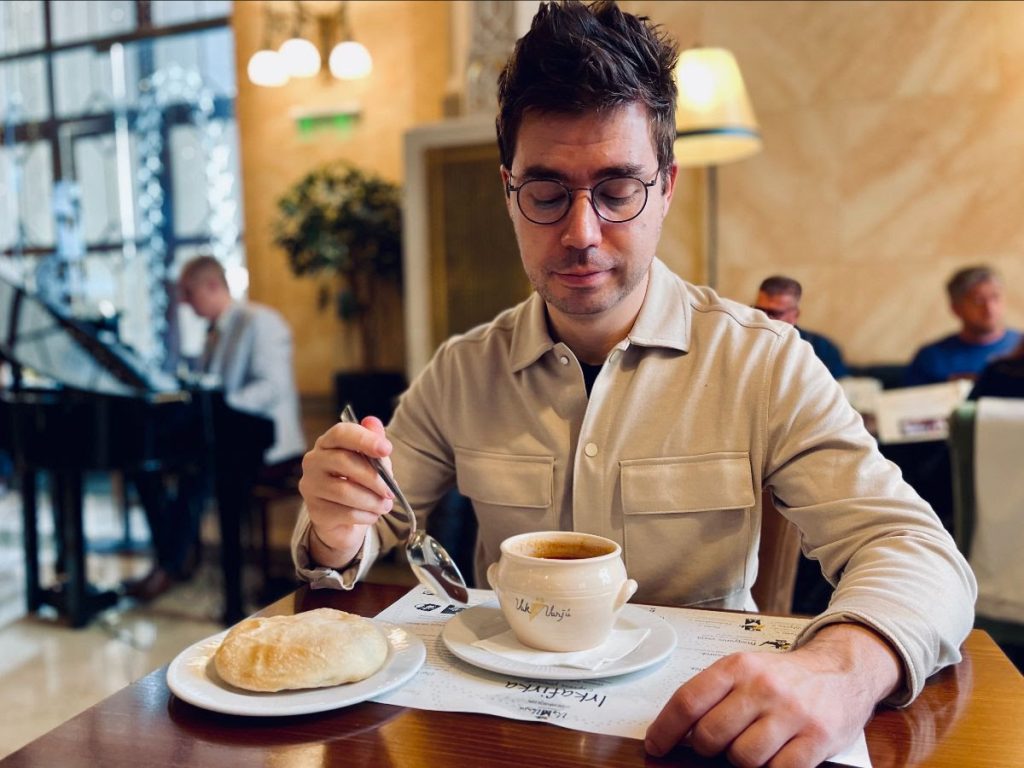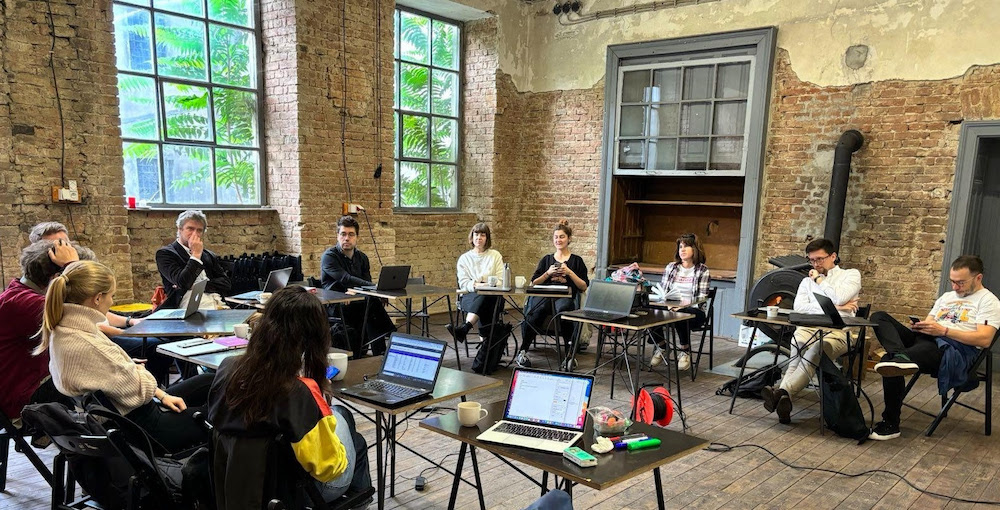Greetings from Brussels, where I knew in advance I wouldn’t be able to find a decent bowl of goulash—so I made sure to have a proper classic one while still in Budapest, where this photo was taken. The next serving of our newsletter is filled with fresh scoops about Slovakia and Hungary. We’re also bringing you the English version of ICJK’s latest on the first serious deepfake hoax targeting a European election campaign. Hint: It looks like pro-Kremlin actors were behind it. Plus, we’re sharing Investigate Europe’s eye-opening story about how EU companies are still importing “critical” metals, worth billions, from Russia. Meanwhile, I’m happy to share that Goulash has surpassed the 1,000 subscriber milestone, but we’re aiming for much more – please share this link with friends and colleagues and encourage them to subscribe! – Szabolcs Panyi, VSquare’s lead Central Europe investigator

Back in 2016, when the soon-to-be founders of VSquare gathered in Warsaw to discuss our cross-border initiative, we worked to come up with a name. Although we eventually settled for VSquare (standing for V4, the Visegrád Four countries), the runner-up name for our site—proposed by Investigace’s Pavla Holcová—was goulash. But no brainstorming session is ever really wasted, and the name will be served as our new newsletter.
SPICY SCOOPS
There is always a lot of information that we hear and find interesting and newsworthy but don’t publish as part of our investigative reporting—and share instead in this newsletter. Two countries are our focus this time: Hungary and Slovakia. A third—Russia—lurks in the background.
SLOVAKIA PUZZLED BY HUNGARIAN SPIES UNDER DIPLOMATIC COVER
On the surface, there’s a blooming bromance between Hungary and Slovakia’s new government. Hungarian foreign minister Péter Szijjártó already offered a handshake and hug to Slovak Prime Minister Robert Fico and key figures of his administration in Bratislava. However, behind the curtains, Slovakia’s foreign policy and security apparatus is puzzled by the number of Hungarian spies in the country. ”It’s unusual among EU allies how many intelligence officers Hungary is sending to Slovakia under diplomatic cover. If you were not an EU and NATO member state, many of your diplomats would not get an agrément [acceptance of diplomatic accreditation by the host country],” a Slovak government official told me. Slovak counterintelligence identified these undercover Hungarian spies, including some who have high-ranking official positions at both the Hungarian Embassy and other Hungarian state-run institutions in Bratislava.
“Your previous ambassador to Bratislava was also an intelligence officer but at least he was openly one [Tibor Pető was a former two-time director-general of Hungarian foreign intelligence, the Information Office]. But that’s very different from sending someone who is undercover,” the source added. A former Hungarian intel officer confirmed the phenomenon, claiming that it actually makes little sense from a real foreign intelligence perspective to station many Hungarian intelligence officers, both undercover and as liaison officers, in Bratislava. “First, Slovakia is our ally. Second, Bratislava is an unimportant place for intelligence officers for networking and sharing information with other allies—there’s Vienna for that purpose. We only send these undercover officers to Slovakia because there’s a political request by the Orbán government,” the former intel officer told. And why is Slovakia not retaliating? “It’s so unusual among allies that we just don’t know how to deal with it. We need to have good relations with Hungary, so we can’t do the same as with Russia,” the Slovak official said, adding that expulsions are out of the question.
In case you missed it, read our previous investigation, “From Hungary with Love”, into the intelligence ties of Hungary’s deputy foreign minister—who has close connections with Slovakia.
RUSSIAN AND HUNGARIAN AMBASSADORS’ STRANGE MEETING
There’s another thing that caught the attention of Slovak officials. During the Slovak election campaign in the summer, Russian Ambassador Igor Bratchikov and Hungarian Ambassador Csaba Balogh—whom Slovakia also identified as having intelligence ties— quietly met, according to one Slovak government official. “Russia’s ambassador to Bratislava was completely isolated in the diplomatic community, no other EU country’s ambassador met him,” the official said. Moreover, in the spring of 2023, the Hungarian ambassador, during a meeting with then-Slovak Prime Minister Eduard Heger, advocated for a pro-Russian turn within the Visegrád Group. “Balogh said that Hungary would wait for the outcome of the Slovak and Polish elections, then restart the V4 cooperation, and have a rapprochement with Russia. He stressed that we need to work with Russia,” the Slovak official explained. (Hungary’s foreign ministry didn’t react to our request for comment.)
DISINFORMATION TARGETING SLOVAKIA PARTLY COMES THROUGH HUNGARY
This is all happening within a larger context: In recent years, the role of the Slovak-Hungarian community has changed dramatically, according to the Slovak government official. “The Slovak-Hungarian community and their information space was a driving force of Slovakia’s EU and NATO integration before 2004. Now, it’s exactly the opposite: pro-Kremlin.” In the late 2010s most of the disinformation in Slovakia still came from Russia, sometimes through alt-right US circles. But nowadays, it’s also coming from Hungary. Why? “Because the Slovak-Hungarian information space is very much influenced by pro-Kremlin Hungarian government propaganda as ethnic Hungarians in Slovakia consume news coming from these Hungarian language outlets,” the official said.
And while the Hungarian government officially campaigned on behalf of the ethnic Hungarian Aliancia-Szövetség party before the September 30 election, “in reality, through Hungarian government propaganda, they were at least equally endorsing Robert Fico, who was portrayed as someone with shared goals in regards of Ukraine and Russia.” However, the connection between ethnic Hungarians’ voting attitude and Hungarian government propaganda is not that straightforward, according to a recent survey.
SLOVAK STRATCOM OPERATIONS AT SERIOUS RISK
Meanwhile, in recent years, the Slovak state at least tried to step up efforts against disinformation and Kremlin propaganda. One of the most important steps was the establishment of departments and institutions within government bodies to deal with strategic communications and hybrid threats. However, given that Fico is back in power, and that he and his allies have well-known track records of disseminating and amplifying disinformation, the fate of stratcom initiatives is at serious risk. “I’m afraid that the new leadership will create an environment where good people will be forced to leave—or they will fire them under some pretext,” a Slovak government official said.
“Leaving of experienced professionals involved in stratcom initiatives would result in a loss of institutional expertise and knowledge,” Andrea Michalcová, security analyst and director of the Prague-based Center for an Informed Society told me, adding that a leadership that doesn’t care about these issues “presents notable risks to the stability, resilience, and overall societal well-being of Slovakia.” Another consequence of a purge could be “heightened scrutiny from international partners and allies if [Slovakia’s] leadership is perceived as indifferent or potentially complicit in such activities, potentially impairing the nation’s standing in the realm of international relations,” Michalcová added.
EUROPEAN SOCIALISTS EAGER TO GIVE ONE MORE CHANCE TO FICO
The Party of European Socialists (PES) will gather in Málaga on 10-11 November and, during the congress, they are expected to reinforce the recent suspension of the membership of Fico’s SMER and Peter Pellegrini’s HLAS party – meaning that their full expulsion is not on the table. “The argument against kicking them out was that Fico’s previous governments had pursued pro-European policies, so let’s wait and see. There’s still some hope that, just like Giorgia Meloni, Fico will break with his anti-EU and pro-Russian campaign rhetoric,” a social democratic MEP told me in Brussels, adding that “we still need to gather evidence for any further decision, but we’ll also monitor his rhetoric”. Because of this, Pellegrini’s HLAS could receive a different – more lenient – treatment as they are still seen as more moderate and pro-EU.
Got a nice scoop to include in our Goulash newsletter? Contact me at [email protected]
NEW ON VSQUARE
SLOVAK ELECTION TARGETED BY PRO-KREMLIN DEEPFAKE HOAX
Remember all that talk about deepfakes and how they might impact elections? The future is now: It’s already happening. Two days before Slovakia went to the polls in late September, a mysterious recording appeared on social media, portrayed as a leaked conversation between renowned Slovak journalist Monika Tódová and the chairman of the liberal Progressive Slovakia party, Michal Šimečka. They were talking about rigging the elections and US interference. The video came out roughly the same time as Russia’s foreign intelligence agency, the SVR, put out a statement with the same accusations. The Investigative Center of Ján Kuciak’s (ICJK) Karin Kőváry Sólymos went after the origins of the AI-generated hoax, mapping how it spread—and, unsurprisingly, found notorious pro-Kremlin Slovak actors behind it.
This deepfake hoax is not only historic because it appears to be the first one dropped in an EU country’s election campaign. According to IPI, it is also “one of the first examples in the EU of AI technology being used to manipulate the likeness of a journalist—and could offer a worrying portend of the future abuse of such tools to smear and discredit the media”.
RUSSIA: EUROPE IMPORTS €13 BILLION OF “CRITICAL” METALS IN SANCTIONS BLINDSPOT
“Why are critical raw materials not banned? Because they are critical, right. Let’s be honest.” This is how David O’Sullivan, the EU’s special envoy for sanctions, explained the absurdity of EU companies importing these materials, continuing to pour billions into mining firms linked to the Kremlin in the process. Investigate Europe’s new analysis, republished on VSquare, explains that 34 of such critical raw materials are still imported from Russia, and their value is stunning: Between March 2022 and July 2023, EU companies paid €13.7 billion to Russian partners. The dependence on Russia is also shown by the fact that up to 90 percent of some types of nickel used in Europe comes from Russian suppliers.
THE FIGHT OVER FREEDOM OF INFORMATION LAWS IN CENTRAL EUROPE
When people ask me about the biggest obstacle to my investigative work in Hungary, I always say it’s the lack of access to information. This regional round-up on freedom of information laws shows that I’m not alone with my problem. In theory, all Central European countries have these transparency laws. However, how they work in practice is a whole different story. In Hungary, all kinds of public information requests are intentionally prolonged, while in Slovakia, the problems were mostly in cases involving personal information or state secrets, or cases being investigated by the police at the time. The Czech Republic has its flaws, too, mostly because requests end up in court—after which it takes several years to actually get the information.

Next year, we have plans to bring you new cross-border investigations focused on environmental issues, including about those who are profiting from some of the most polluting industries. In Brno in October, hosted by Deník Referendum and supported by Journalismfund Europe, VSquare’s core partners gathered to brainstorm and coordinate on these projects. Stay tuned!
BREWING IN THE BOTTOM
SLOVAKIA CRACKS DOWN ON WHISTLEBLOWERS. In recent years in Slovakia, several prominent police investigators were protected from political retaliation by their status as whistleblowers. However, Robert Fico’s new government appears to be scrapping whistleblower protection – ICJK’s Tomáš Madleňák summed up what’s happening:
“In Slovakia, two foreign ministry employees, Zuzana Hlávková and Pavol Szalai, brought to light suspicious procurements made during the Slovak EU presidency in 2016. They faced serious consequences as they had to leave their job, and the case never led anywhere. This was the case where then-PM Robert Fico attacked journalists covering the case, calling them ‘dirty anti-Slovak prostitutes.’ Another case was that of Filip Rybanič, who worked at Tatra Banka and provided journalists with information from the bank accounts of then-interior minister Robert Kaliňák (currently the new Minister of Defense). Kaliňák received wired transfers from Ladislav Bašternák, who has since been sentenced for tax fraud.
Rybanič faced criminal prosecution, the courts sentenced him to five and then three years of probation. Eventually, the supreme court overturned the verdict and, in November 2022, he was found not guilty. The case remains controversial since Rybanič did break bank secrecy, but Zuzana Dlugošová, chairwoman of the Slovak Whistleblower Protection Office, did not see a reason why the banking sector should be exempt from whistleblower protection rules (read this interview with her). The Whistleblower Protection Office was established in 2021, precisely with the aim of providing protection in cases such as those above. If a person contacts the office, they can be granted whistleblower status. A person with this status cannot be fired and their job description and details cannot be changed by the employer without an explicit consent from the Office.
However, the new Fico government quickly disregarded the law. Several police investigators in the team of Ján Čurilla, who have in the past several years worked on the most explosive cases of corruption and organized crime with links to the previous Fico governments, had previously been granted whistleblower status by the Office, as they faced backlash from within the law enforcement agencies and reported on the crimes from within. The same was true for Peter Juhás, a policeman who previously led the team that investigated the murder of Ján Kuciak and Martina Kušnírová, and who, until November 6, 2023, led an internal anti-corruption unit responsible for investigating crimes of other policemen. Despite the law, incoming Minister of Interior Matúš Šutaj Eštok suspended the investigators around Ján Čurilla and replaced Peter Juhás.
Lawyers of Čurilla claimed the suspension is not valid as the Whistleblower Protection Office was not even consulted. The Office itself claims that any acts against protected whistleblowers without its agreement are invalid by law, and points out that the minister “even proceeded against the guidelines of the Ministry of the Interior itself,” and threatens the ministry with a high fine. Yet, the suspended investigators were unable to enter their workplace when they tried to continue their work.”
If you liked our scoops, stories and exclusive analysis, give it a try and read some further articles by our partners!
MORE TO READ FROM OUR PARTNERS
NARCOFILES: DRUG LORDS HIRE HACKERS TO HELP THEM GET COCAINE THROUGH PORT INSPECTIONS. The import of cocaine to Europe is at its peak, with the drugs being high in quality and prices remaining the same. But how to get the shipments through port security? Easy: Hire a hacker! Investigace’s article telling how a low profile programmer became a valued asset for organized crime is a part of the international NarcoFiles project investigation. (Text in Czech.)
POLES IN THE SERVICE OF THE CARTELS. FRONTSTORY was also part of the NarcoFiles project, and their story explains how Poles in the Netherlands organized the assassination of a journalist-turned-witness in the trial of a brutal mob. Polish ports are also part of the drug trafficking route: Since the outbreak of the war in Ukraine, it’s actually been one of the most important routes. The investigation also reveals how Polish labs mix cocaine before the drug hits the market. (Text in Polish.)
THIS IS WHAT SYSTEMIC CORRUPTION LOOKS LIKE. Atlatszo’s article shows how public procurements in Hungary are rigged. In this scheme, the winner is always the same, just like the competitors and—very often—even the procurement consultant. This is backed up by analysis of several hundred public procurement procedures. The site also reported their findings to Hungary’s Public Procurement Authority and the Integrity Authority. (Text in English.)
THOUSANDS OF HOSPITAL PATIENTS ARE DYING FROM TERRIBLE INFECTIONS. Direkt36’s gigantic investigation into hospital infections revealed not only how deep the problem is, and that the government is busier covering it up than solving the problem (PART I), but also, through obtaining and analyzing data, created a list of worst and best performing hospitals (PART II); uncovered shocking examples of unhygienic practices (PART III); and explained some best practices from elsewhere in Europe (PART IV). (Text in English and Hungarian.)
This was VSquare’s eighth Goulash newsletter. I hope you gobbled it up. Come back soon for another serving!
SZABOLCS PANYI & THE VSQUARE TEAM
VSquare’s Budapest-based lead investigative editor in charge of Central European investigations, Szabolcs Panyi is also a Hungarian investigative journalist at Direkt36. He covers national security, foreign policy, and Russian and Chinese influence. He was a European Press Prize finalist in 2018 and 2021.







